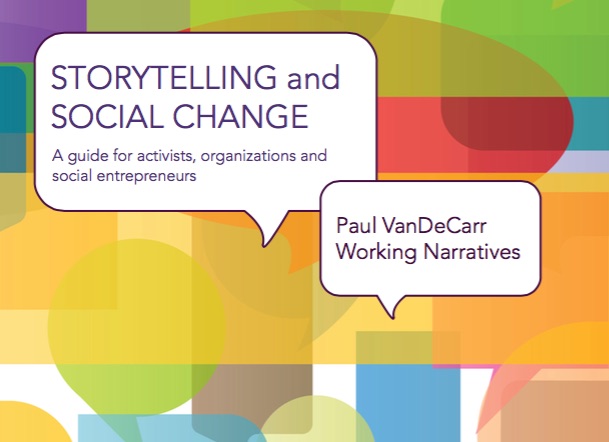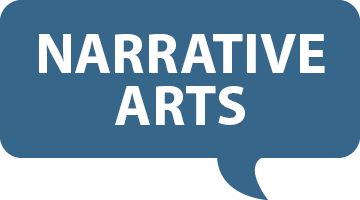“Storytelling and Social Change” guide!
Sign Up for Free Download of Guide

The second edition of “Storytelling and Social Change” is available in two different formats.
- ONLINE version has complete links to videos, articles and stories mentioned in the guide. Share the whole guide or individual chapters by email and social media.
- PDF version is available by signing up using the form above. Also fully linked, and in one easy-to-read document. Once you sign up, you can also download a PDF of the first edition of the guide, which was for grantmakers.
The second edition of the guide covers how to develop a strategy to guide your work, how to tell great stories in any format and engage audiences, some methods used in telling stories for social change, and the structure you need to incorporate stories into your everyday work.
Lastly, the guide features an afterword by Deepak Bhargava, the executive director of the Center for Community Change.
THANK YOU
Special thanks to the Skees Family Foundation for their belief in this project and for being the first grantmaker to support it.
Big thanks also to the Open Society Foundations, the Evelyn and Walter Haas, Jr. Fund, and the William and Flora Hewlett Foundation for their support of this guide.
Boundless appreciation to the Nathan Cummings Foundation, and especially Maurine Knighton and Brandi Stewart, for being an outstanding partner with Narrative Arts since the beginning.
Thanks to individual donors, including Alexandra Christy, Peter Dowson, Elizabeth Hakas, Jonathan Kauffman, Andy Veluswami, and anonymous donors.
Thanks for editorial support to consulting editor Ross Mudrick, and copy editor Case Edwards.
Many thanks to The Chronicle of Philanthropy, where some of the material in this guide was first published.
THE FIRST EDITION
The first edition of the guide, published in 2013 and aimed at grantmakers, was based on over 75 interviews with funders, communications experts and storytellers of all sorts. It looked at the recent history of storytelling and social change; reviewed the theories of change behind this work; provided case studies of 10 projects and their funders; offered guidance on every stage of grantmaking; included sidebar interviews and other features; and listed resources for additional exploration. The guide also featured a foreword by playwright and actress Anna Deavere Smith, and an afterword from philanthropy expert Gara LaMarche. It was supported in part by funding from the Brimstone Grant as administered by the National Storytelling Network.
The first edition can be downloaded, along with the new edition, by signing up via the form at the top of this page.
Story Guide Project Map
Health Media Initiative of the Open Society Foundations, New York, NY.
Project summary: Media and communications support for grantees of the Open Society Foundations’ Public Health Program; the stories empower the storytellers personally and make a case for policy change.
Narrative challenge: Creating the conditions so that members of marginalized groups participate in making the policy decisions that affect them, rather than them being given a voice in policy debates only to tell their personal stories.
Evaluation metrics: Content produced, exposure gained, change in policy or conditions, and the increased strategic communications skills of grantees.
WITNESS, Brooklyn, NY. With support from the Overbrook Foundation.
Project summary: Human rights organization that engages advocates, citizen witnesses, and key stakeholders in policy, law, media, and academia on the use of video to address diverse human rights issues around the world.
Narrative challenge: Ensuring that the changing media and technology landscapes better protect human rights, and that people using video to create change can do so safely and effectively.
Evaluation metrics: Number of training resources created, and activists and citizen witnesses trained and supported; adoption of new human-rights-friendly standards and practices in the technology and international criminal-justice fields.
Stories of Change, a partnership between the Sundance Institute, Park City, UT, and the Skoll Foundation, Palo Alto, CA.
Project summary: A partnership between the Skoll Foundation and the Sundance Institute that supports films about social entrepreneurs and the global challenges they deal with.
Narrative challenge: Creating the mechanisms to successfully move film viewers through a “funnel” of engagement—to get them more and more deeply involved in the issue of the film.
Evaluation metrics: Quality of the film, size and demographics of the target audiences, cost-per- viewer expense, and specific outcomes pertaining to the issue that a film deals with.
Voice of Witness, San Francisco, CA. With support from the Panta Rhea Foundation.
Project summary: Oral-history book series that educates a mass readership of students, teachers, and others on human rights crises; outreach is done via educational organizations, class visits, workshops, book talks, and other events.
Narrative challenge: Developing strategies with partner organizations and invested communities to ensure that the books have an ongoing positive impact.
Evaluation metrics: Number and diversity of audiences reached, books sold, and schools and organizations incorporating the books into their curricula and advocacy work.
Neighborhood Story Project, New Orleans, LA. With support from a private funder.
Project summary: High school students and others report and write nonfiction stories from New Orleans, publish them in high-quality books, and earn royalties. Promotes media justice, and fosters civic dialogue on issues facing New Orleans.
Narrative challenge: Steering authors towards a place that’s both truthful and healing.
Evaluation metrics: Number and diversity of its publications, total book sales (over 40,000 to date), continuing involvement of book authors in the organization, and such factors as the use of the books in the 9th-grade curriculum by the New Orleans Recovery School District.
Cornerstone Theater, Los Angeles, CA. With support from the Ford Foundation.
Project summary: Socially engaged theater company that involves L.A. residents and visitors as sources of dramatic material, actors, audiences, and participants in dialogue.
Narrative challenge: Making choices—the ones that characters make on stage, and the ones that the author and other artists make about what stories are, or are not, included in a given play.
Evaluation metrics: Number and demographics of people engaged, and qualitative feedback throughout the
life of a project. The theater hosts reunions and other opportunities to glean the long-term impact, such as community projects that have sprung from its process.
Harvard professor Marshall Ganz, Cambridge, MA.
Marhsall Ganz is a senior lecturer in public policy at the Kennedy School of Government at Harvard University. He volunteered as a civil rights organizer in Mississippi, then in 1965 began a long tenure with Cesar Chavez and the United Farm Workers, where he became Director of Organizing. He completed his Ph.D. in sociology in 2000.
A template used for training of volunteer leadership teams in Barack Obama's 2008 presidential campaign was devised by Marshall Ganz and was based on teams sharing the “story of self, the story of us, and the story of now.” Ganz now teaches the practice—which he calls Public Narrative—to civic associations, community organizations, and advocacy groups worldwide.
The New Organizing Institute in Washington, DC draws heavily on Ganz’s frameworks for their trainings on Public Narrative.
New Organizing Institute's trainings in Public Narrative, Washington, DC. With support from the Rappaport Family Foundation.
Project summary: Leadership framework devised by organizer and Harvard professor Marshall Ganz, adapted as a template by the 2008 Obama campaign for its volunteer teams, and now used by organizations worldwide. The New Organizing Institute has drawn heavily on Ganz’s framework for its Public Narrative trainings and tools.
Narrative challenge: Creating an environment conducive to people being vulnerable in telling their stories, which is important because vulnerability leads to connection and commitment.
Evaluation metrics: For the New Organizing Institute, number of people trained, increase in leadership capacity of trainees, qualitative feedback in pre- and post-training surveys, and headway in engaging the progressive “emerging majority” of people of color and unmarried women.
Working Narratives' project Nation Inside, Wilmington, NC. With support from the Media Democracy Fund.
Project summary: A web platform and story training program for people in the movement to challenge mass incarceration. Storytelling boosts people’s personal investment, deepens organizing, and builds power for policy change.
Narrative challenge: Connecting people’s personal stories to policy change and to larger challenges in the growth in incarceration in the U.S.
Evaluation metrics: Number of people trained and stories uploaded, movement growth, survey feedback, policy changes.
Orton Family Foundation's Heart & Soul Method, Middlebury, VT.
Project summary: Story-collecting and story-sharing process for use in small cities and towns, which enables residents to articulate shared values and vision for purposes of community building and community planning.
Narrative challenge: Using stories not just in the initial phase but throughout the planning and development process. Streamlining the process of harvesting values from stories to use in the planning process.
Evaluation metrics: Nearly 30 indicators on community participation, capacity, articulation of values and vision, action taken, stewardship, and scaling up.
GlobalGiving's Storytelling Project, Washington, DC. With support from the Rockefeller Foundation.
Project summary: Method of gathering “micro-narratives” from large numbers of people in areas where partner organizations work in order to yield qualitative data for program assessment and growth. Also serves the field of international development.
Narrative challenge: Keeping the stories coming in organically, with only volunteer field staff managing the scribes.
Evaluation metrics: Number of organizations that use the story data in grant proposals and for decision making.
